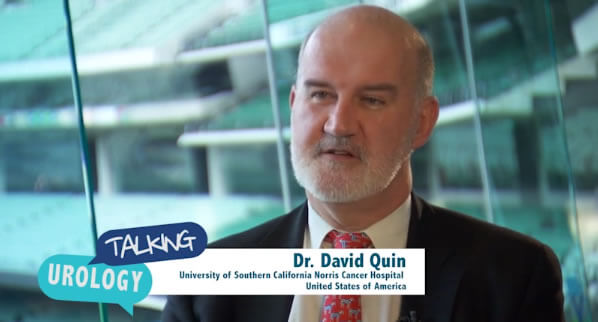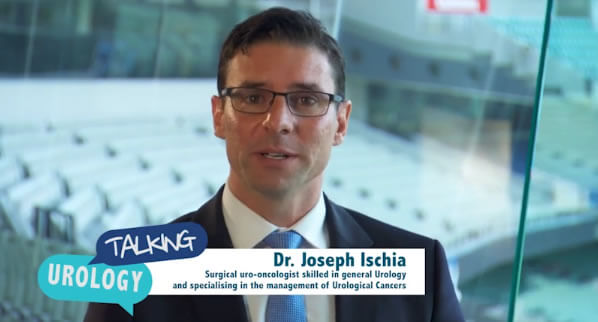ANZUP 2018 – Prof Chris Sweeney
Prof Chris Sweeney discusses intermittent versus continuous ADT in metastatic hormone sensitive prostate cancer. Can you balance survival and quality of life?
Talking Urology Podcast Transcript
ANZUP 2018 Interviews – Chris Sweeney
Joseph Ischia: I am lucky enough to be chatting with Chris Sweeney who has come all the way over from the States even though it does not take much to encourage him to fly across the Pacific to join us. Welcome to ANZUP. Can you give us some of the highlights of what’s your talk regarding intermittent versus continuous ADT?
Chris Sweeney: Well, the first highlight, Joe, is always coming and chat with you on Talking Urology.
Joseph: We’ve run through the script, alright. Let’s get to what we actually have to do.
Chris: You have the best podcast face that we know on the podcast scene, don’t we? So, Joe, yes, this actually is a great form. It’s one from multidisciplinary form, but it also engaging patients in the conversation about research agenda and the deficiencies of what our knowledge on how best to treat patients and so there is a controversy, I think, of which men should have their hormonal therapy commenced and have a treatment break versus those who should be on it continuously. We’ve got studies that have combined patients that have just a rising PSA, they may have something on the PSMA PET but nothing on conventional scans and then the other extreme of patients who have high burden of disease and may have a poor response. So, I feel there is a place to individualize who we should put on a course of treatment. If they have a great response, if they’re having side effects, but metabolic gaining weight, poor blood sugar control, cardiovascular risk factors going up or they’re having significant psychological impairment from. Some people get depressed really despondent especially if they lose the libido and they do enjoy getting their testosterone back. So, I give it a go and say to patients if you have a good response and we’re having problems with it, we’ll see how you go because you may be one of the few patients who do benefit but when we put everyone’s data into the mix the individual patient experience gets missed.
Joseph: So, just saying, just bringing you back to your point of you think the ideal patient to stop it. So, just say you had a patient who was a very good responder but very few side effects, would you continue ADT on that person?
Chris: Yeah, it’s a good question. So, we have this notion but starting to learn that if the patient has just two bony metastases and they are found a few years after their prostatectomy, not a prostatectomy you did because none of your patients relapsed, Joe?
Joseph: Never. None of them
Chris: Never seen that, no. So, but these are patients, from the time you start their hormonal therapy to the time that they, on average, those men live longer than seven, eight years. So, they will be castrate, low-testosterone for eight years or so, so I have had many patients and as Declan Murphy, one of your colleagues describes, so you’ve got one patient that does well is an anecdote and if you have multiple patients who do well in your case series you call that anecdata. But I’ve had enough patients who I have treated for eight, nine, ten years intermittently and they all do report they had better vitality, maybe not so much sexual functioning but better vigor and vitality and feel better and I keep asking them, would you like a break, and I leave it up to them to decide and many men who have had the experience and had many months of hormones and some patient’s testosterone does rebound very quickly, some men basically have testicles of steel, it would appear, and a very vibrant and enjoyed the testosterone coming back and I don’t think it compromises their overall survival because they had better vitality, less cardiovascular risk factors and more functional and exercising more.
Joseph: Okay, so let’s clarify that because that is for quite specifically the M1 metastatic disease. How about people that have nodal disease or PSA recurrence after prostatectomy, do you think that there were different group of people because my understanding was that I thought M1 intermittent bad, but PSA recurrence after treatment, intermittent not inferior.
Chris: Correct. So that’s why I say this. The data is somewhat confusing. At the end of the day the M1 data set is said to be the definitive study, the swab study is not statistically complete, but that is why I say when you have uncertainty like that, the patient’s individual experience, the more patients you treat the more patients you know, but you’re absolutely right. The patient with the rising PSA is someone who we don’t even know if they need to start treatment for a rising PSA. So, in that scenario what I have done rightfully or wrongfully, but I think it happens somewhat in Australia as well, access novel PET imaging. In the United States we have Axumin and you have PSMA, may be given a shot of radiation if we see something and a course of hormones and see if we can actually try and cure them in that setting but that needs to be subject to a clinical trial, but that’s one scenario. But if the patient has a slowly dribbling rising PSA, avoid starting the hormones, do periodic scans on an annual basis and that’s about maybe about a third of the patients who have a rising PSA after prostatectomy or radiation. Another third will have a slowly rising PSA and then it will accelerate and if their PSA doubling time is more than six months, it’s not long before you will see something on the scan but there are types of patients we try to get on vaccine-type trials where we try and use non-hormonal therapy approach to slow down the progression. But if a patient has a PSA doubling time that’s less than three months their outlook is very similar to someone who has metastatic disease.
Again, individualize it of who I would start with hormonal therapy, but if they get a good remission, I will stop the hormonal therapy and if they are having a long time off the hormones I will give them even treatment breaks again to continue into it, but if they have a short time off of it there’s not much point doing the stop and start. But going to the metastatic setting again remember how we’re now seeing and using more potent hormonal therapies, we’re getting more patients into deeper remissions such as with the drug abiraterone and prednisone that may get approval or listed in Australia fairly soon especially if it goes generic and it’s much more affordable, you’re going to be having patients who have hypertension, long-term prednisone exposure and having a deep remission and I think it’s going to be even more imperative to give them those patients a treatment break such they are not inducing diabetes and other negative effects and if they’re having a great response and are they are destined to live a long time you are not going to induce other health issues that will compromise their life expectancy.
Joseph: Fantastic, Chris. Thank you very much. Well, I’ve got a good face for podcasting. Your talks are best represented in a photo.
Chris: Good work, Joe.












